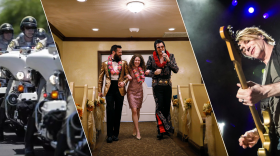Elvis. The King of Rock 'n' Roll. He had the hair. The jumpsuits. The hips. And, yes, Las Vegas.
As his career faded in the 1960s, the '50s rockabilly star signed a four-week contract at the new International Hotel. It was his first live audience show in eight years.
He would go on to perform at the International for seven years. It revived his career. And it paved the way for the residencies that are now casino staples on the Strip.
Today, July 31, is the 50th anniversary of Elvis' residency. The milestone inspired journalist and author Richard Zoglin to write the book Elvis in Vegas, which was released earlier this month.
“For him to come back and sort of reinvent himself as a performer in Las Vegas is just an amazing achievement, and I think for those early years especially, he was absolutely at his peak as a performer,” Zoglin told KNPR's State of Nevada.
Before coming to Las Vegas to perform, Elvis was making movies and recording albums but not playing live.
“I think ... as the movies were getting kind of worse and Elvis was getting more restless, he really wanted to go back on stage,” Zoglin said.
Following the legendary 1968 comeback TV special, Elvis was hot again and Las Vegas seemed like a perfect match. Zoglin said not only did the residency help Elvis, it also helped the city.
“Vegas needed to reinvent itself to keep up with the changing times,” he said.
During the '60s, the younger generation wasn't visiting the city and rock 'n' rollers weren't really playing the Strip.
“Elvis was kind of a perfect bridge to the rock ‘n’ roll generation even though he was an older performer,” Zoglin said.
The King brought in a broader audience, with more families and more Middle American visitors coming to the city.
Loanne Miller Parker was working at the International when Elvis opened his residency. She later worked for Elvis' longtime manager Colonel Tom Parker and eventually ended up marrying him.
She said a buzz took over the city when Elvis announced his residency.
“It was a big deal just like it was a big deal the first time everyone saw Elvis on television,” she said.
What wasn't a big deal, she said, was to have him walking around the hotel. Parker noted it wasn't the first time someone "wonderful" had walked around Las Vegas, and that the staff was used to having celebrities around and would give them space.
Parker said despite frequent claims that Elvis always deferred to Parker, Elvis made his own decisions. She said it was his choice to come to Las Vegas.
“He was ready for this. He was ready to come back. He loved his fans,” she said.
She said Elvis trusted the Colonel with business decisions and promoting the show, while the performer took care of the creative aspects.
Parker said as she got to know Elvis, they talked about spirituality. She found him to be "an amazing person."
“He was surprised that he had been given this talent, that he had been given the chance to become what he was,” she said.
But that fame came with a price. He was now responsible for the livelihoods of dozens of people.
However, his biggest struggle was with insomnia. When he was in the army, he was given medication to both fall asleep and wake up. He soon became addicted.
Parker said everyone in Elvis' inner circle was aware and tried to help, but ultimately couldn't do much.
Zoglin doesn't blame Las Vegas and the endless nightlife it offered for Elvis' decline. But he does think Elvis tired of the production.
“I think that the Vegas years got to be so routine for him -- the same thing over and over again that he just started to get bored. I think that contributed to the drug use.”
That drug use became a vicious cycle that the King of Rock 'n' Roll could not break from.
Despite his untimely death eight months after he played his final Vegas show, Elvis lives on in Las Vegas to this day, with Elvis impersonators still making a living.
But Zoglin believes Elvis' legacy goes far beyond the white jumpsuits and gold sunglasses worn by buskers on Fremont Street.
“Elvis was the model for the new Vegas shows -- not the old Sinatra, Rat Pack-style [shows],” he said, “Elvis’ show was a different kind of show. It wasn’t an intimate nightclub-style show. It was a big, rock-concert-like spectacle.”
Friday, August 2
7 p.m. to 8:30 p.m.
Clark County Library East Flamingo
Richard Zoglin, journalist and author; Loanne Miller Parker, former employee of the International Hotel and widow of Elvis manager Col. Tom Parker.










